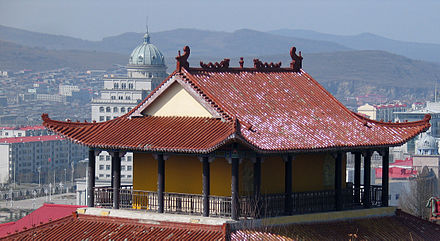Suifenhe - county-level city in Heilongjiang, China
Suifenhe (绥芬河; Suífēnhé) is a city in Heilongjiang Province. It is on the border with Russia and is China's gateway to Vladivostok.
Understand
Suifenhe is inland and elevated. As such it has warm summers and bitterly cold winters. From December to January a daytime maximum of -15°C is not uncommon.
Mandarin is dominant but Russian speakers are not hard to come by. English speakers are rare.
Get in
Suifenhe is accessible from Harbin by daily coaches, frequent minibuses from Mudanjiang and trains, including an approximately bi-weekly train (8 hours) that continues through to Vladivostok and is often booked out for a few weeks in advance. The bus station also seems to double for a night market. From the Russian side, trains and coaches cross the border (~20 km of no man's land) to Ussurisk, a 4-hour trip. Trains also have a change of gauge, which takes some time.
By bus
Buses to Vladivostok do not leave from the bus station across from the railway station, which is for domestic routes. The international bus station is a fair bit away, take a taxi for about ¥10-20 (depending on bargaining skills). The last bus departs for Russia in the early afternoon and the terminal will be closed from around 4PM, you may purchase the ticket in the early morning on the same day of departure though. Note: The terminal may just look like any closed shop with corrugated iron covering the entrance, do not be fooled as the buses leave from inside the big building.
Not all buses go straight to Vladivostok but will involve a change somewhere on the Russian side. Many Russians returning to Vladivostok after shopping in China will have their cars parked just on the other side of the border and may provide you with a lift if lucky.
Given that you have all your papers sorted the border crossing is straightforward and a short 5-10 min bus ride from the terminal. Guard(s) on the Chinese side speak fluent English and might be curious of non-Russian/Chinese passports. You are required to take all your items with you when crossing the border, do not leave bags on the bus as it will be thoroughly searched. Expect a fair bit of waiting as there may be other vehicles being searched as well.
(Information valid as of May 2010)
By train
Overnight from Harbin (waiting room 4) leaves at 8:30PM and arrives 7AM. ¥88 for hard sleeper with fan.
The building with big Cyrillic lettering at the top beside where the train stops.
The train leaves for Pogranichnyy, Russia (Пограничный, 44°24′N, 131°23′E) (perhaps GeCheng in Chinese) at around 9AM. It arrives in Pogranichnyy at 11AM (2PM Russia). (July 3, 2010) ¥130/person (¥15 for a white piece of paper they take away from you plus the cost of the ticket).
The price is subject to scheming and might prove suspect at times.
The Chinese border crossing opens around 8:30AM. The people running this route seem to be regulars who bring Chinese goods into Russia. On the Russian side, try to get your entry cards on the train as the line of traders going through customs is intimidating (40+min).
After departing from the station, remember to set your clock 3 hours ahead and cross the train tracks via the stairs on your left to the bus station/market area. A bus leaves to Vladivostok at 3:55PM (12:55PM China time) and takes about 4 hours (2 hours to clear customs and make it to the bus station).
A trip on this route from Harbin to Vladivostok by train and bus takes just under 21 hours. The countryside travelled through on the train is incredible.
Get around
See
Do
Buy
Yuan and rubles are readily accepted. ATMs are mainly found around the main square and accept VISA/MasterCard and appear somewhat unreliable, some also seem to demand a six digit pin. If so, try adding 00 before your four-digit pin. Changing U.S. dollars is possible but time consuming (you'll need a photocopy of your passport, which can be obtained nearby, for a fee).
Like all border towns there is an assortment of goods to buy.
Eat
Up the stairs in front of the train station and left across the bus station (not the one with buses to Vladivostok) is a street lined with restaurants.
- Breakfast Buffet Place. Look for a packed restaurant with a table filled with breakfast items. Lots of dumplings, deep fried/breaded stuff, soups, Chinese salad-type things, egg-based dishes. All delicious and all cheap. A couple big items, bowl of soup and a plate of salad should cost about ¥4-5. Bring it to your table and the waitress will calculate it for you.
- California Beef Noodle King. Looks like a knock-off of this Chinese restaurant chain.
Drink
Sleep
- The place. If you find yourself stuck in Suifenhe, which is not unlikely given the infrequency and changing nature of buses to Russia, this place on the square in front of the train station will do fine. Cheap and basic but with a friendly owner and a reasonably secure feeling. Appears negotiable but less than ¥50 for private room
Connect
Internet cafe
A Chinese ID is required to access Net bars.
Go next
Suifenhe
suifenhe.gov.cnHeilongjiang
Primary administrative division
